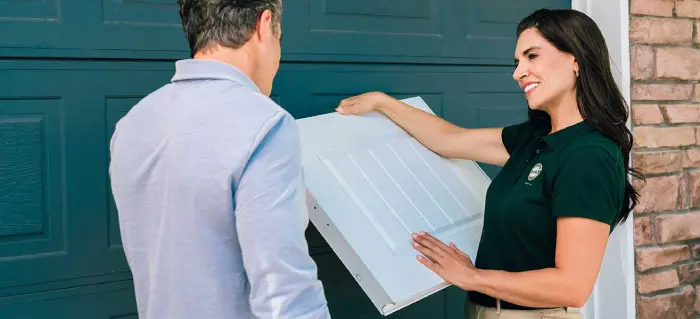
The average garage door replacement cost can range. Several factors can impact how much a garage door replacement costs, including door type, material, and size.
Have you been staring at your dented or creaky garage door and wondering, “How much does garage door replacement cost?”
The actual price can be influenced by everything from the size and material of the door to features like insulation and potential opener repair or replacement.
This comprehensive guide dives into the various elements that impact the cost of your garage door replacement project and what you can expect to pay on average for each factor.
We’ll also explore the benefits of working with a professional for a safe and efficient installation process, ensuring your new garage door looks fantastic and functions flawlessly for years to come.
Table of Contents:
- Average Garage Door Replacement Cost
- 16 Factors That Influence Garage Door Replacement Cost
- Should You Replace or Repair Your Garage Door?
- Professional vs. DIY Garage Door Repair
- How To Save Money on a Garage Door Replacement
- FAQ
- Trust Precision for Your Garage Door Replacement
Average Garage Door Replacement Cost
Replacing a garage door can range due to a variety of factors. This wide range reflects several factors that can influence the final price, such as door type, material, size, and additional features.
Additionally, labor rates will vary depending on your location and the complexity of the installation. While you may be able to just replace the garage door itself, if your existing garage door opener doesn’t have enough power, or too much power, to handle the weight of your new door, you may need to replace it as well, which will add to the total cost.
16 Factors That Influence Garage Door Replacement Cost
The cost to replace your garage door can vary based on several factors. For instance, standard single garage doors are less expensive than heavier, more intricate doors with windows, insulation, or decorative features are. Here’s a breakdown of the key influences.
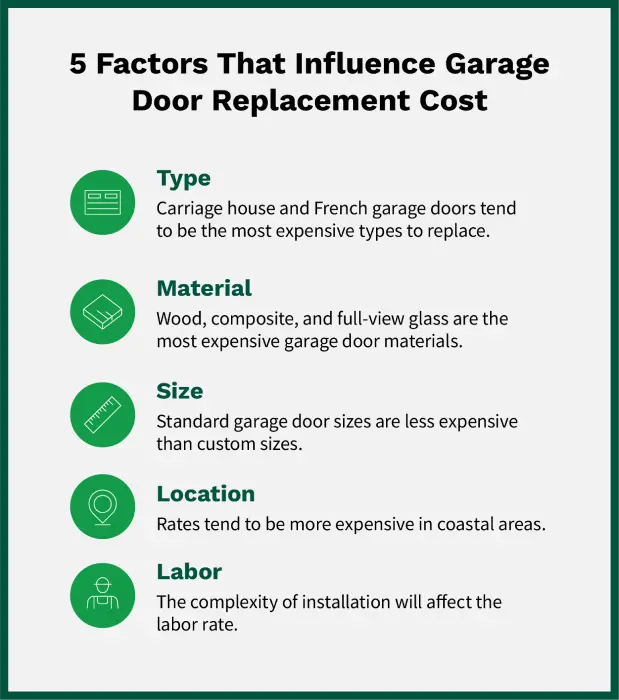
1. Type of Garage Door
The type of garage door you choose is a major cost factor. Here’s a look at how different types impact the price.
- Tilt-up canopy: This basic, single-panel door hinges upward and protrudes partially outside the garage when open. These are lower cost.
- Tilt-up retractable: A tilt-up retractable door is similar to a tilt-up canopy door, except it has a track system that folds the entire panel inside the garage when opened. They require more ceiling room and have a more complex mechanism, which raises the cost.
- Carriage house: These doors offer a traditional carriage house aesthetic. While some appear to be double doors with handles, they lift up as a typical garage door does. Others swing open on vertical hinges, automatically or manually. They’re generally heavier and more complex, making them a more expensive option.
- French: French garage doors are similar to carriage house doors in style and function. However, they tend to be a bit more intricate in terms of aesthetics, often featuring arches, windows, wood, or detailed accents.
- Sectional: This is the most common type of residential garage doors. They consist of hinged sections that open vertically along a track.
- Standard panel: This refers to a basic, flat sectional door with minimal design elements. It’s typically the most economical choice.
- Walk-through: This is a small door integrated into a larger garage door that allows pedestrian access without opening the entire door. It adds convenience but increases the overall door cost.
2. Materials of Garage Door
The material you choose for your garage door significantly impacts the overall cost. Generally, more durable materials come with a higher price tag. Here’s a breakdown of how common materials affect the price.
- Steel: This material is durable and requires minimal upkeep. It’s also fairly affordable compared to other materials, making it a popular option.
- Aluminum: While lightweight and rust-resistant, aluminum can dent more easily than steel does.
- Composite: This material is made from a blend of wood fibers, plastic, and resins.
- Full-view glass: A full-view glass garage door offers an improved external appearance and natural light inside.
- Wood: For classic beauty and excellent insulation, wood garage doors are a great option. However, wood requires regular maintenance and is often the most expensive material.
- Faux wood: This offers the look of wood with lower maintenance needs. It still has a higher price tag than steel or aluminum have.
- Vinyl: This is a budget-friendly, rust-resistant option. However, vinyl garage doors may not be as durable as other materials, especially in harsh climates.
3. Size of Garage Door
Garage door size is a major factor influencing the replacement cost. Here’s what you can expect:
- Standard sizes vs. custom: Standard single and double garage doors are the most affordable options. However, if your garage has a non-standard-size opening, you’ll likely need a custom-made door. These typically cost more due to the additional materials and labor involved.
- Double vs. single doors: Two single doors for a two-car garage can be slightly more expensive than a single double door is. This is because they require two separate door frames and installation processes.
4. Location
The location of your home can also influence the cost of replacing your garage door. Here’s a breakdown:
- Labor rates: Generally, labor rates tend to be higher in coastal areas compared to those in the Midwest.
- Material availability: The availability of certain materials in your region might also play a role in the cost. Custom materials or those requiring special transportation may cost more in certain locations.
- Local building codes: Building codes vary by location and may influence the design or installation requirements for your garage door, potentially affecting the cost.
5. Labor
The average cost of labor for garage door replacement varies. Some garage door companies may include this as part of their overall package quote, and some may price it separately. Here are some factors that affect the rate:
- Complexity of installation: Some door types are more complex to install than others are. Additional security features or a new garage door opener can also add to the complexity and time it takes to complete the project.
- Number of workers: In most cases, one or two workers can handle a garage door replacement. However, extensive projects or those requiring specialized skills might involve a larger crew, increasing the total labor cost.
Additional Cost Factors
Beyond the core elements of your door, material, size, and location, several additional factors can influence the final cost of your garage door replacement project, such as the following:
- Insulation: Adding insulation to your garage door improves energy efficiency, but is an additional cost. Consider your climate and how often you use the garage to decide whether insulation is worthwhile.
- Wiring: If your existing garage doesn’t have electrical wiring for an automatic opener, adding it will require an electrician and additional cost.
- Removal: Some quotes may include removal and disposal of your old door, while others may charge extra. Expect to pay for removal and disposal.
- Repair: If your existing door opener needs repairs during the replacement process, that will add to the overall cost.
- Tip: While tipping isn’t an expectation, some may give a tip per installer if they’re exceptionally impressed with the installer’s professionalism or efficiency.
- Permits: Depending on your location, building permits might be required for garage door replacements.
- Manual vs. automatic: Manual garage doors are typically less expensive to install than automatic ones with openers are.
- Windows: Adding windows to your garage door allows natural light in but increases the price compared to a solid door. The type of glass you choose for your windows can affect the cost as well.
- Resizing: If your garage door has a non-standard-size opening, you’ll need a custom door, which is typically more expensive.
- Security: Reinforced materials, deadbolts, locks, and other security features will add to the cost but enhance your garage’s security.
- Customization: Detailed designs such as molding, decorative elements, or uncommon materials increase the total cost compared to a basic garage door.
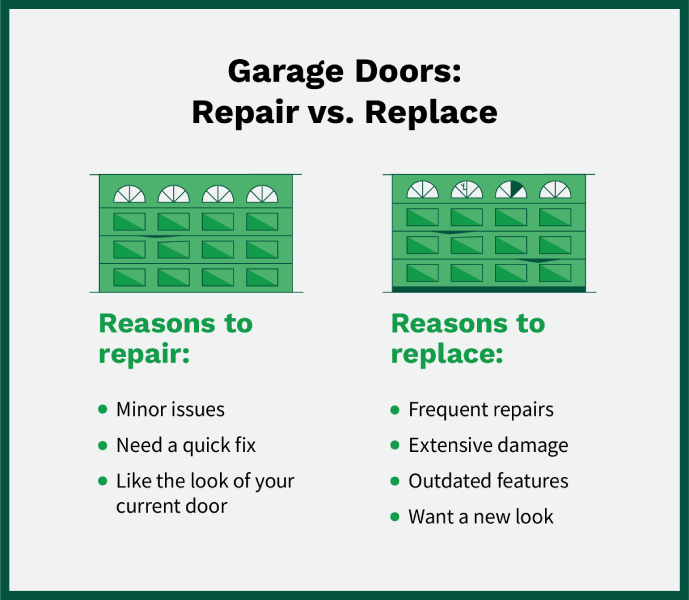
Should You Repair or Replace Your Garage Door?
If your garage door is malfunctioning, you’re faced with a crucial question: Should you repair or replace it? While repairing a seemingly minor issue might seem like the budget-friendly option initially, some factors to consider may sway you toward a full replacement:
- Hidden issues: A seemingly simple problem, such as a broken spring, could indicate underlying wear and tear on other components. Patching up one issue might lead to a domino effect of repairs down the line.
- Age and efficiency: Older garage doors often lack the insulation capabilities of newer models. Replacing your door with a more energy-efficient option can save you money on heating and cooling costs over time.
- Safety concerns: As garage doors age, safety mechanisms can become compromised. Replacing your door ensures you have the latest safety features and a more reliable system.
While garage door repair can solve immediate problems, it may cost you more in the long run. A full replacement may be a smarter investment for peace of mind, improved efficiency, and potentially avoiding a string of future repair costs.
5 Signs It’s Time To Replace Your Garage Door
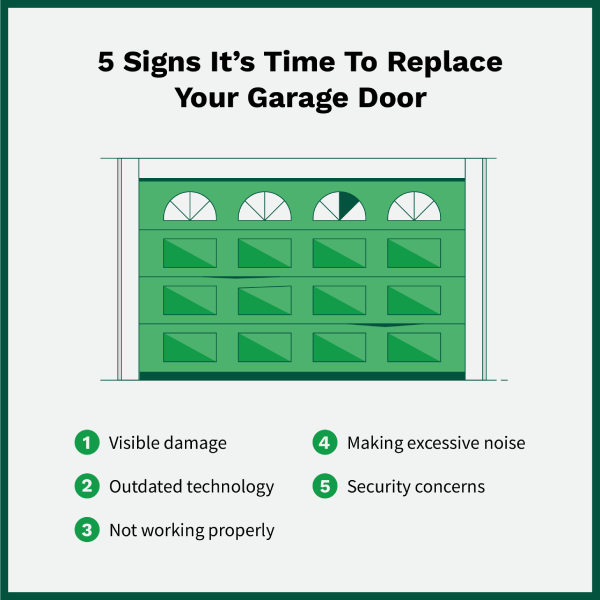
If your garage door is looking a little worse for wear or isn’t operating as smoothly as it used to, it may be time for garage door replacement. Here are some key signs it may be time to purchase a new garage door:
- Visible damage: A dented garage door, cracks, or rust not only detracts from your curb appeal but also compromises the structural integrity of your garage door.
- Outdated technology: Garage door technology and safety features have come a long way. If your door is older, it may lack modern conveniences such as a garage door opener app or energy-efficient insulation.
- Not working properly: Does your garage door open and close unevenly or hesitate before moving? These are signs of potential spring, roller, or opener system problems. Ignoring these issues can lead to a complete breakdown.
- Making excessive noise: A well-maintained garage door should operate quietly. If yours is constantly creaking, grinding, or making other loud noises, it’s a sign that something needs attention.
- Security concerns: Your garage door is a major entry point into your home. If yours is damaged or doesn’t have advanced security features, it could leave you and your family vulnerable.
Benefits of a New Garage Door
While a new garage door can certainly elevate your home’s aesthetic, it’s also an investment that enhances functionality, security, and value. Here are some reasons why garage door replacement matters:
- Increased curb appeal: A beautiful new garage door instantly transforms the look of your house, making it more attractive and welcoming.
- Less maintenance: Modern garage doors are built with durable materials and require less upkeep than older models do.
- Improved convenience: Enjoy the ease of automatic openers, smartphone control, and automation through smart home integrations.
- Improved security: New doors offer advanced features like reinforced materials, high-security locks, and automatic reversal systems to deter break-ins.
- Added home value: A recent Remodeling National Cost vs. Value Report found a 102.7% return on investment on garage doors, meaning a full recoup of costs plus a tidy profit.
- Reduced noise: Eliminate the clanking and grinding of an old door. Updated models tend to be quieter and run more smoothly.
- Improved energy efficiency: Well-insulated garage doors help regulate temperatures in your garage and adjoining rooms, potentially reducing your energy bills.
- Customization options: Choose from a variety of styles, materials, and colors to personalize your garage door and complement your home’s architecture.
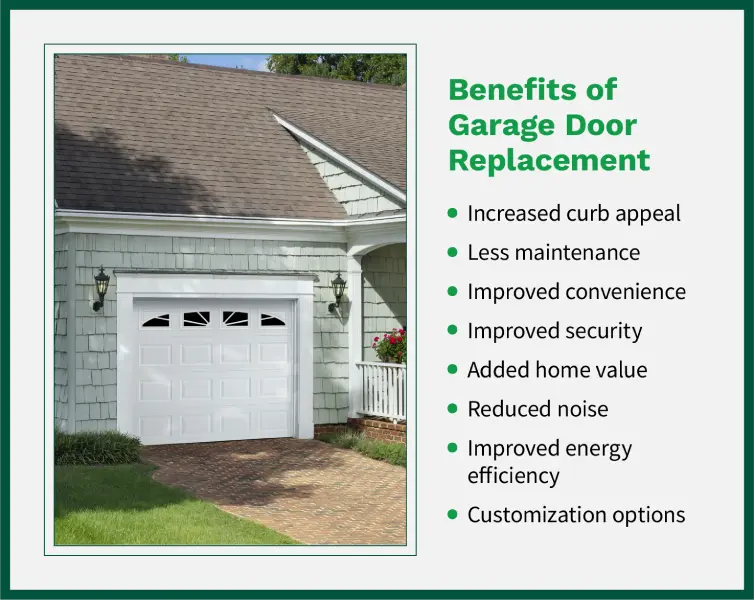
Professional vs. DIY Garage Door Replacement
Replacing your garage door might seem like a straightforward DIY project. However, there are significant advantages to hiring a professional installer. While the initial cost may seem higher upfront, you’ll likely save money down the road by steering clear of expensive mistakes and potential injuries.
Professional garage door technicians have the expertise and experience to handle the job efficiently and safely. They can ensure proper installation according to building codes and safety standards. This not only avoids the risks of improper functioning but also protects your warranty.
What To Consider When Hiring a Professional
Choosing the right professional for your garage door replacement ensures a smooth process and a quality job. Here are some key factors to consider:
- Cost: Get quotes from multiple reputable companies. Don’t just focus on the cheapest option; consider the value proposition and the services included.
- Experience: Look for a company with a proven track record and experienced technicians. Ask about their expertise with similar projects and the types of garage doors they install.
- Level of service: Inquire about the services offered beyond installation. Does the company provide pre-installation inspections, haul away old doors, or offer warranty coverage?
- Customer reviews: Read online reviews and testimonials from past customers to get a sense of the company’s reputation and customer service standards.
- Customization options: Discuss the range of materials, styles, and colors available to ensure you can find a door that complements your home and meets your functional needs.
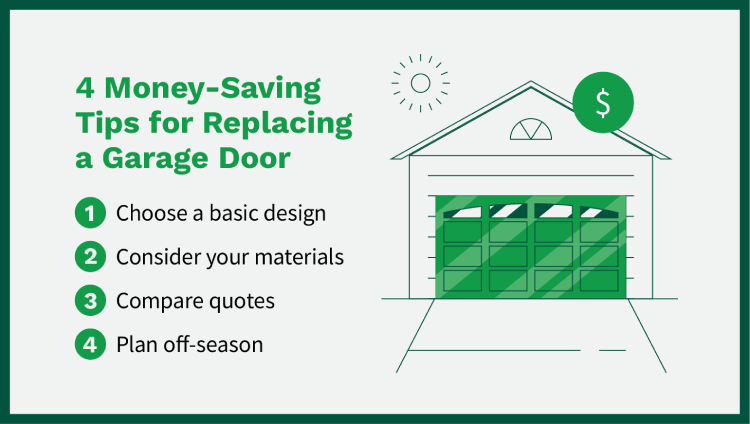
How To Save Money on a Garage Door Replacement
Replacing your garage door doesn’t have to break the bank. Here are a few strategies to keep your project cost-effective:
- Choose a basic design: Opt for a simple, standard panel door with minimal features. Skip the decorative windows, faux finishes, or other customizations that can increase the price.
- Consider material options: Steel garage doors are a durable and affordable choice, offering a good balance between cost and performance. While wood offers a classic look, it requires more maintenance and is pricier.
- Compare quotes: Shop around and get estimates from several reputable garage door companies to compare pricing and services. Be mindful of online garage door deals that seem too good to be true, as they might be a bait-and-switch tactic leading to a higher-priced recommendation.
- Plan off-season: Garage door replacement projects are often in higher demand during spring and summer. Consider scheduling your installation during the fall or winter when there might be deals or more flexible appointment slots.
FAQ
Want to know more about the cost of replacing a garage door? Here are the most common questions answered.
How Much Should You Spend on a Garage Door?
A number of factors affect how much a garage door replacement costs, such as door type, material, and size.
What Is the Cheapest Way To Replace a Garage Door?
The cheapest way to replace a garage door is with a single-layer steel model in a standard size with minimal features. You might be tempted to further save by installing it yourself, but there are numerous dangers involved so hire a professional.
Why Are Garage Doors So Expensive?
Garage doors can be expensive because of their size, function, and durability. They need to withstand weather elements, secure your belongings, and operate smoothly, all while potentially contributing to your home’s curb appeal.
How Long Does a Garage Door Last?
If a garage door is maintained well, it can last anywhere from 15 to 30 years. Quality materials can produce longer lifespans.
How Long Does Garage Door Installation Take?
Garage door installation typically takes half a day to a full day, depending on the complexity of the door and the ease of removing the old one. A straightforward installation can be completed in a few hours.
Trust Precision for Your Garage Door Replacement
Garage door replacement isn’t a one-size-fits-all decision. It involves factors such as your home’s architectural style, desired functionality, budget, and climate. That’s where Precision Garage Door Service® can help.
Our experienced professionals will guide you through every step of the selection process, assessing your needs and preferences to ensure you get the appropriate door for your home.
So, how much does a garage door replacement cost? Request an appointment with Precision Garage Door Service today for a transparent quote tailored to your specific needs.
This article is intended for general informational purposes only and may not be applicable to every situation. You are responsible for determining the proper course of action for your property. Services should be performed by licensed and experienced professionals. Precision Garage Door Service is not responsible for any damages that occur as a result of this blog content or your actions. For the most accurate guidance, contact a Precision Garage Door Service professional for a custom, on-site assessment.